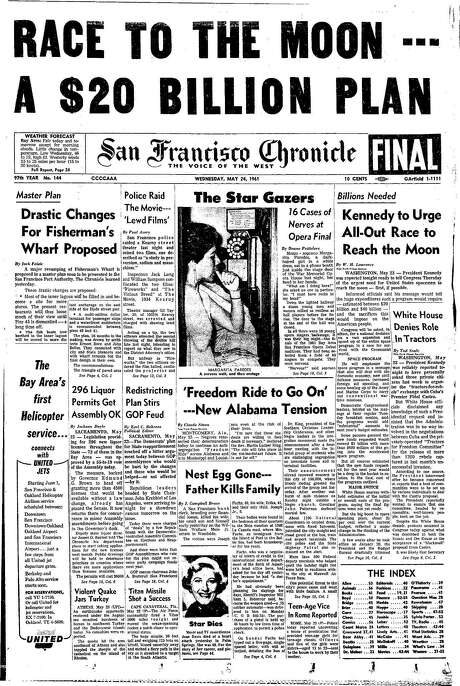Monday, June 11, 2018
An alternate narrative of JFK's commitment to the moon
[I would love some pushback on this. The following goes very much against the conventional narrative which always makes me nervous. If I missed something obvious, I'd rather it gets pointed out here before I build on it.]
The standard story centers on how the nation's imagination was captured by an audacious dream of sending a man to the moon. You've all heard the words of the speech that inspired the country, “We choose to go to the moon...” Except it didn't. The speech was an attempt at drumming up support for a not-that-popular program. As best I can tell, it was a fairly minor and underwhelming effort. It only achieved greatness retroactively due to the tragedy and triumph that came afterwards.
What else does the standard narrative get wrong?
1. Despite everything you hear about the tensions between JFK and LBJ, Kennedy knowingly committed his administration to what was probably Johnson's most cherished policy objective going back to his days in the Senate. Kennedy even put Johnson in charge of National Aeronautics and Space Council. Increasing the budget for manned space exploration was deeply controversial with in the administration. Kennedy's own science advisor, Jerome Wiesner was strongly opposed to it. One of Kennedy's last acts as president was dismissing Wiesner.
2. Of course, administrations failed to deliver on commitments all the time. It could very easily have been pushed aside and things turned out differently.
3. Is also worth noting that while we now see this as a bold objective, the goal did not seem as wildly ambitious at the time. [This is where I veer sharply from the conventional narrative, so this would be a good place to focus your objections.] It is essential to remember where the country's attitudes and expectations toward technology and progress were in the early sixties. As I have said probably too many times, like the late 19th/early 20th centuries, the postwar era was a period of explosive ubiquitous change. As with the turn of the century, there was a sense of constant acceleration. Everything seemingly came faster and easier than the experts predicted. Kennedy was being ambitious, but probably not as ambitious as we tend to remember him being.
4. While modern commentators choose to emphasize soaring rhetoric and the importance of visionary leaders, the overwhelming driver of the space race was the Cold War. There were very real and disturbing consequences to losing this race, both strategic and symbolic. What's more, there was a strong symbiotic relationship between the military and programs like Mercury and Apollo.
5. The Apollo program proved to be far more expensive than expected and quite controversial. Even with the impetus of the Cold War, the decision not just to see it through, but to make the deadline owes a great deal to a series of events breaking in its favor, particularly the assassination and the '64 landslide. Both the legend of JFK and the political power of LBJ meant that Apollo would get what it needed.
Today the very term “moonshot” has become one of the most reliable red flags for bullshit in the 21s century. We tell ourselves lies about what happened than hold up a fabricated past to justify the lies we tell ourselves about the present.

No comments:
Post a Comment